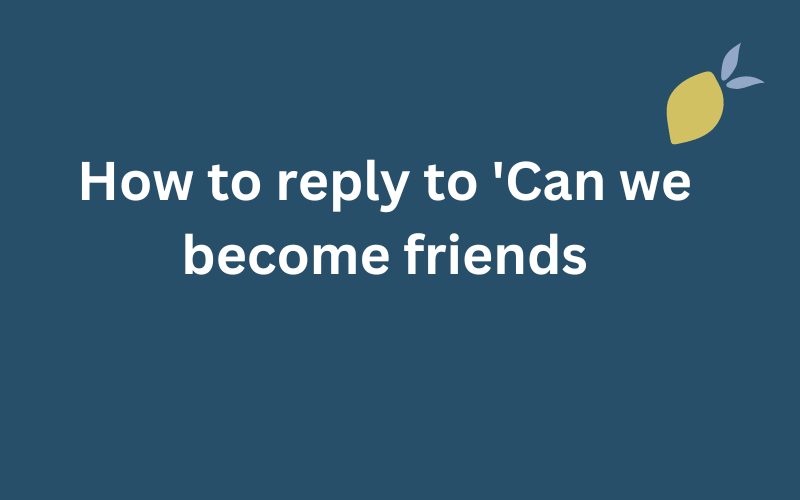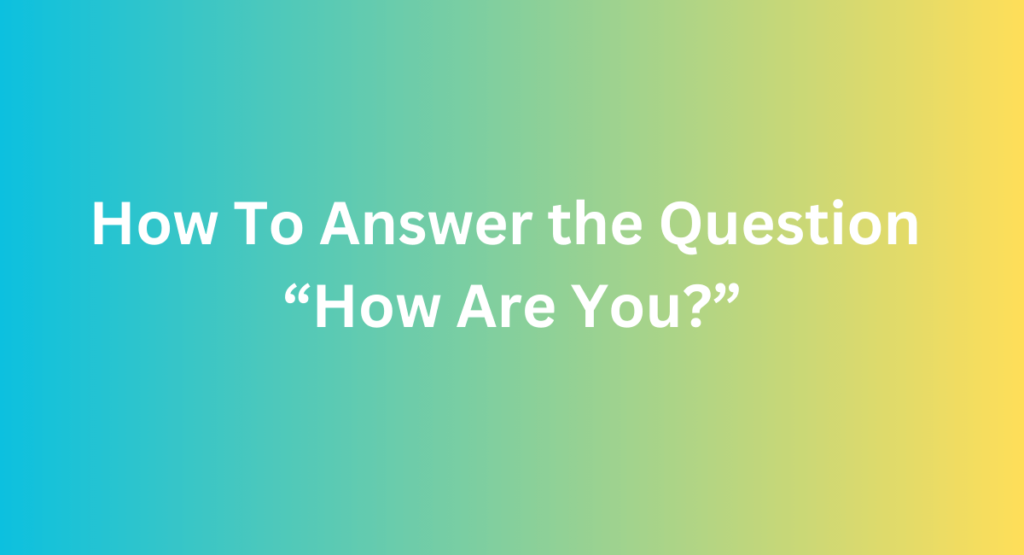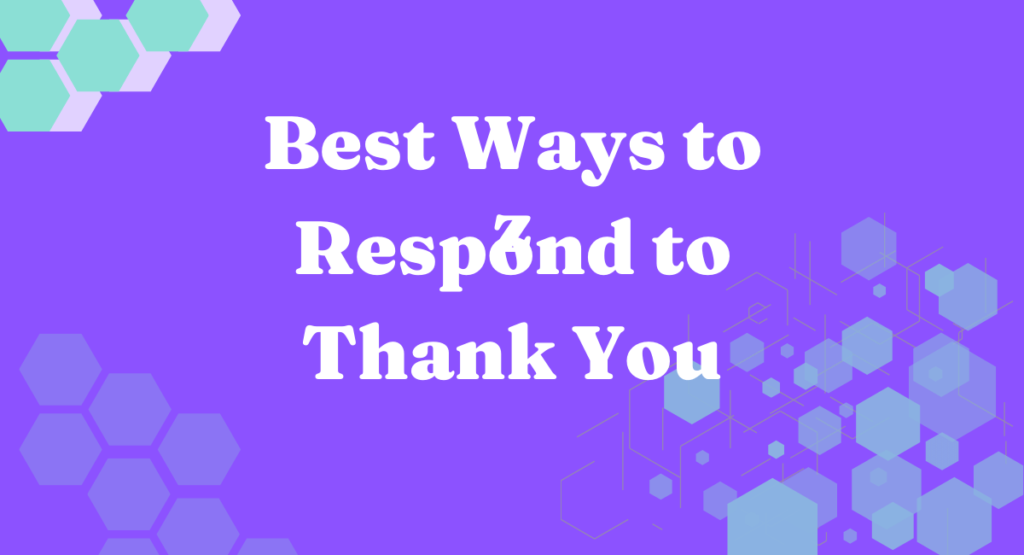Sure, I’d love to be friends! Thank you for considering me as a friend.
I value your friendship and look forward to getting to know you better. Building and maintaining friendships is an important part of human interaction. When someone asks if you can become friends, it’s crucial to respond in a positive and welcoming manner.
We will explore some effective ways to reply to the question, “Can we become friends? ” By following these suggestions, you can foster a strong foundation for a new friendship and create meaningful connections with others. So, let’s dive in and discover the best ways to respond when someone expresses interest in forming a friendship with you.
20 Common Reply
1. “Absolutely! I’d love to be friends.”
2. “That sounds great! I’m always up for making new friends.”
3. “Sure thing! I’m excited to get to know you better.”
4. “Of course! I think we could be great friends.”
5. “Yes, let’s be friends!”
6. “I’d be honored! Let’s start this friendship journey.”
7. “I was hoping you’d ask! Let’s be friends.”
8. “Friendship? Count me in! Let’s do this.”
9. “Absolutely, I’d love to be friends with you.”
10. “Friendship? That’s music to my ears. Let’s do it!”
11. “Yes, let’s be friends! I’m looking forward to it.”
12. “I’m all for it! Friends it is!”
13. “Sure thing! Friends make life more enjoyable.”
14. “That would be fantastic! Let’s become friends.”
15. “Friendship? I’m in! Excited to get to know you better.”
16. “I’m thrilled to hear that! Let’s be friends.”
17. “Absolutely! I’m always open to making new connections.”
18. “Yes, let’s be friends! I’m excited about it.”
19. “Friendship? I’m on board. Let’s make it happen.”
20. “That would be wonderful! Let’s start our friendship journey.”
Casual Reply Can we become friends
When faced with the question, “Can we become friends?”, a casual reply can set the tone for a potential new friendship. Responding in a relaxed and friendly manner can pave the way towards building a meaningful connection. While the question may seem simple, the answer holds the power to initiate a bond based on mutual interests and shared experiences. So, the next time someone asks, “Can we become friends?”, a casual and positive response might just be the beginning of a new and exciting chapter.
Here are some extended casual replies:
Funny Response Can we become friends
Are you tired of the same old “Can we become friends” requests? Spice things up with a funny response! Making new friends can be an adventure, and a lighthearted approach can set the stage for an exciting connection. Let’s explore some amusing and witty replies that can add a dash of humor to the question “Can we become friends?”
Here are 10 funny responses:
“Sure, but fair warning: I come with a lot of puns.”
“Of course! But just so you know, I snort when I laugh.”
“Sure, but be prepared for my terrible dance moves.”
“Absolutely! But I hope you’re okay with receiving random memes at 3 AM.”
“Yeah, but I have to warn you, my jokes are dad-level.”
“Sure thing! But I hope you’re ready for my extensive collection of bad jokes.”
“Absolutely, but I must warn you, my karaoke skills are lethal.”
“Of course! Just know that my cooking skills are inversely proportional to my friendship level.”
“Yeah, but I should warn you, I tend to steal fries.”
“Sure, but I hope you’re cool with my obsession with talking to my pet plants.”
“Absolutely, but just so you know, I have a habit of talking to myself.”
“Sure, but be prepared for my questionable fashion choices.”
“Yeah, but I must warn you, I have a black belt in sarcasm.”
“Of course! But I hope you’re okay with my occasional ‘dad jokes’.”
“Sure thing! But fair warning: I have a knack for accidentally setting off fire alarms when I cook.”
Polite Response Can we become friends
When it comes to building connections with others, a polite response can go a long way. The question “Can we become friends?” is an opportunity to open the door to a potential new relationship. By responding in a polite and friendly manner, you show that you are approachable and open to forming a connection. Making a positive impression with a polite response can set the foundation for a budding friendship.
Here are 10 polite responses:
“I would be delighted to be friends with you.”
“That sounds wonderful. I’d love to be friends.”
“I’d be honored to be your friend.”
“Of course, I’d be happy to build a friendship with you.”
“Thank you for asking! I’d be more than happy to be friends.”
“Yes, I’d be pleased to have you as a friend.”
“Certainly, I’d be grateful for the opportunity to be friends.”
“That would be lovely. I’m open to forming new friendships.”
“Yes, I’d be honored to get to know you better and become friends.”
“Certainly, let’s embark on this friendship journey together.”
Understanding The Context
When someone asks, “Can we become friends?” it’s important to consider the context before crafting your response. Understanding the situation and the nature of your current relationship will help you provide a thoughtful answer that aligns with your feelings and intentions. In this article, we will guide you through analyzing the situation and considering the relationship, so you can effectively reply to this question.
Analyzing The Situation
Before replying to the question, take a moment to analyze the situation. Reflect on why the person is asking to become friends and what it means for both of you. Consider the following factors:
- The history of your relationship: Think about how you met and the experiences you’ve shared so far. Have you been friends in the past or are you transitioning from a different type of relationship (such as colleagues, classmates, or acquaintances)?
- Their intentions: Try to understand the intentions behind their request. Are they genuinely interested in building a friendship or is there another motive involved? Analyzing their behavior, past interactions, and any signals they have given can provide valuable insights.
- Your feelings: Assess your own emotions and desires. Are you open to becoming friends with this person? Do you value their presence in your life? Understanding your thoughts and preferences will help you respond authentically.
- Compatibility: Evaluate how compatible your personalities, interests, and values are. Consider whether you share common ground and if your friendship would be mutually fulfilling.
Considering The Relationship
Once you’ve analyzed the situation, it’s time to weigh the impact of your relationship on your decision to become friends. Here are some aspects to consider:
- The potential benefits: Think about the positive outcomes of becoming friends. Will it enhance your social life, provide support, or offer new opportunities for both of you?
- The potential risks: Consider any potential risks involved in accepting or rejecting the offer. Will it complicate the current dynamic? Could it potentially lead to hurt feelings or misunderstandings?
- Your comfort level: Assess your comfort level with developing a friendship. Consider whether you have the time, energy, and emotional capacity to invest in nurturing a new friendship.
- Communication and boundaries: Discuss your expectations and boundaries openly. Clarify what being friends means to both of you in terms of involvement, communication frequency, and emotional support.
Remember, understanding the context and analyzing the situation will help you make an informed decision in your response. Consider both your feelings and the implications of accepting or rejecting the offer to become friends. Now that you have a better understanding, you can provide a genuine and thoughtful response.
Assessing Your Feelings
Assessing your feelings is an essential step when someone asks, ‘Can we become friends?’ It’s important to reflect on your emotions and intentions before responding. Consider clarifying your intentions and evaluating compatibility to ensure your reply is thoughtful and sincere.
Clarifying Your Intentions
When someone expresses a desire to become friends, it’s important to clarify your own intentions. Reflect on whether you genuinely want to pursue a friendship with this person. Ask yourself if you value their companionship and if you are willing to invest time and effort into nurturing a friendship. Be honest with yourself as you evaluate your willingness to establish a meaningful connection with them.
Evaluating Compatibility
Compatibility is a crucial factor in forming friendships. Consider whether your personalities, interests, and values align. Reflect on whether you believe that establishing a friendship with this person would be mutually fulfilling and meaningful. Assessing compatibility can help you determine if embarking on a friendship with this individual is a positive and rewarding endeavor.
Exploring Communication Options
When someone asks if we can become friends, it opens up a new opportunity for connection. Exploring communication options is crucial in responding to this question. How we express our thoughts and respect boundaries can shape the future of the friendship. In this article, we will discuss two significant aspects of replying to this question: expressing your thoughts and respecting boundaries.
Expressing Your Thoughts
When a person expresses the desire to become friends, it’s essential to respond with honesty and clarity. Here are some ways to express your thoughts:
- Be appreciative: Respond with gratitude for their honesty in expressing interest in a friendship.
- Express openness: Let the person know that you are open to exploring the possibility of friendship.
- Clarify intentions: Ask if they have any specific activities or interests in mind when suggesting a friendship.
- Suggest communication channels: Propose different ways to communicate, such as meeting in person, talking over the phone, or chatting online.
Respecting Boundaries
While expressing your thoughts is crucial, respecting boundaries is equally important in building a healthy friendship. Here are some ways to ensure you respect the other person’s boundaries:
- Ask for consent: Before suggesting any activity or communication platform, ask if they are comfortable with it.
- Agree on shared boundaries: Discuss and establish boundaries that both parties are comfortable with to ensure a respectful and balanced friendship.
- Listen actively: Pay attention to their preferences and concerns, ensuring that you value their perspective.
- Communicate openly: Encourage open dialogue to address any issues or discomfort that might arise during the friendship.
Remember, building a friendship is a two-way street. By expressing your thoughts and respecting boundaries, you create a strong foundation for a meaningful connection. So, the next time someone asks if you can become friends, take the opportunity to explore communication options while nurturing a positive and respectful relationship.
Navigating The Response
When someone asks “Can we become friends? “, it’s important to respond with honesty and genuine interest. You can reply by expressing gratitude and saying something like “Thank you for considering me as a friend. I value your friendship and would love to!” This shows your appreciation for the offer and your eagerness to build a friendship.
Being Honest But Kind
When responding to a friend request with “Can we become friends?” it’s important to be honest yet kind in your reply. It’s okay to express your true feelings while also considering the other person’s emotions. Here’s an example of a response:
“Hey, [Friend’s Name]. Thanks for reaching out and expressing your interest in becoming friends. I appreciate your honesty. While I’m not sure about becoming close friends at this moment, I’d be open to getting to know you better and seeing where our friendship leads in the future.”
This response is polite and acknowledges the person’s efforts, while also setting boundaries and maintaining honesty. It shows that you value their friendship, but need more time to develop a deeper connection.
Offering Alternatives
If you’re not comfortable with the idea of becoming friends, it’s important to offer alternatives in your response. This can help soften the rejection and provide the other person with other possibilities for connection. Here’s an example:
“Hey, [Friend’s Name]. Thank you for reaching out and expressing your interest in friendship. While I appreciate your kind offer, I’m not looking to add new friends to my circle at the moment. However, I’d be more than happy to connect with you on social media or join a group activity where we can interact and get to know each other better.”
This response acknowledges the person’s request for friendship and offers alternative ways to connect. It shows that you’re open to staying in touch but on a more casual level.
To sum it up, when responding to a friend request with “Can we become friends?”, it’s crucial to navigate your response with honesty and kindness. Being clear about your intentions and offering alternative avenues for connection can help maintain a positive and respectful relationship.
Managing Expectations
When someone asks, “Can we become friends?” it’s important to manage the expectations and communicate effectively.
Setting Boundaries
Setting clear boundaries from the outset can help establish a healthy foundation for the friendship. Be honest about your intentions and express any concerns or limitations you may have.
Fostering A Healthy Friendship
Once the boundaries are set, focus on fostering a healthy friendship. Invest time in getting to know each other, participating in activities together, and engaging in open and honest communication.
Frequently Asked Questions On How To Reply To ‘Can We Become Friends
How Do You Respond When Someone Says Let’s Be Friends?
When someone says “Let’s be friends,” respond with gratitude and acceptance of their offer.
How Could We Make New Friends Answer?
To make new friends, join clubs or groups, offer help, listen, show openness and effort, and choose good friends.
Why Do They Say We Can Be Friends?
When someone says “we can be friends,” it usually means they want to maintain a friendship after a failed romantic or sexual relationship. It’s their way of salvaging the connection.
What To Do When She Says Let’s Be Friends?
When she says let’s be friends, respect her wishes, and focus on building a platonic friendship.
Conclusion
Are you worried about how to handle a “Let’s be friends” request? Remember, it’s okay to set boundaries and prioritize your feelings. You have the power to decide what’s best for you. Be honest, communicate openly, and don’t be afraid to say no.
Your well-being matters.







Wow, awesome blog format! How long have you been running a
blog for? you make running a blog look easy. The total glance of your web site
is great, as smartly as the content!
Thanks